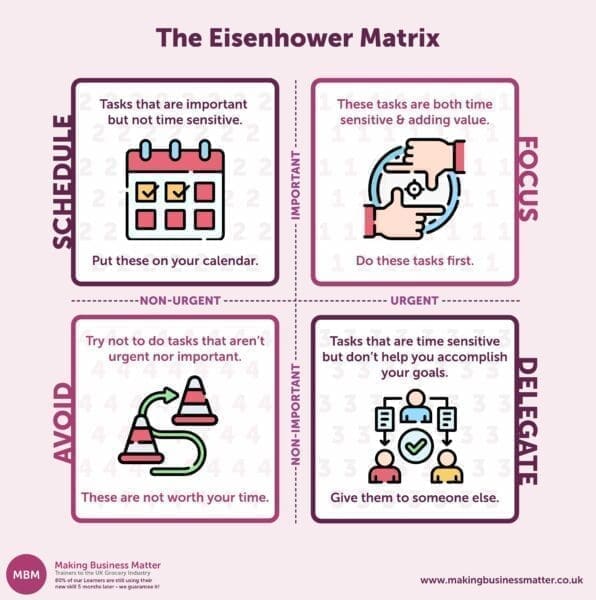Work Smarter, Not Harder
We live in an age of advanced technologies, automation, and social media. There’s an abundance of easily accessible tools, gadgets, and services that can help us with our daily tasks and boost our productivity. And yet, business leaders spend on average almost 22 hours each week on so-called low-value, unproductive tasks that contribute very little to the growth of their company.
Similarly, regular employees spend less than 60% of their time productively. But the trick isn’t in working hard, but to work smarter. By honing your time management skills and learning how to organise your work life you’ll be able to boost your productivity and propel your personal and professional growth. Let’s discuss some practical tips.
1. Prioritise Your Tasks
Not all tasks are of the same importance, and not every task brings you the same revenue. And yet, every single one of them has to be completed. Even those simple and seemingly unimportant are like cogs in a machine. It’s a good idea to make a master list of all your plans, tasks, and goals. Split it into monthly, weekly, and daily efforts to make them more manageable.
This will help you put things into perspective, allowing you to work smarter. You will then be able to figure out what needs to be done immediately and what can be postponed. There are some time-management strategies that you can use too.
2. Use the Eisenhower Matrix
Named after the former U.S. president who developed it, this tactic can help you distinguish your urgent tasks from the important ones.
The difference between these two lies in the fact that urgent tasks are those that need to be taken care of as soon as possible. For example, certain emails, calls, or news you receive which require your immediate reaction. On the other hand, important tasks can be the long-term goals that you’ll significantly benefit from. However, they don’t have to be completed right away.

The Eisenhower Matrix helps you categorise your tasks by putting them in 4 different quadrants:
- Important and urgent. These tasks should be attended to immediately.
- Important but not urgent. Schedule these tasks in your calendar.
- Urgent but not important. As these are low-value tasks, delegate them.
- Neither urgent nor important. Forget about these tasks, and eliminate them from your schedule.

3. Eat That Frog and Get That Task Done
1 in 5 people admits that their procrastination has gotten so out of control that it jeopardises their jobs, relationships, and even health. How’s that possible? You know that feeling when there’s a big, important task looming large in your mind, to such an extent that you can’t do anything else but fret about it? We’ve all been there, but luckily, there’s a way to learn to stop procrastinating.
Instead of wasting your time ruminating about how it seems like climbing Mt. Everest, work smarter by eating that frog right away and get it over with. Once you tick that most challenging task off your to-do list, you’ll be more motivated to deal with smaller and easier tasks.
Sticky Learning ® is 7 times more effective than 1-day training courses. Plus, you will get a Chain of Evidence proving your Return on Investment. Discover soft skills training that changes behaviours long term.

4. Never Multitask If You Want to Work Smarter
People usually pride themselves on being very good at multitasking. Some even put this skill on their C.V.! However, science claims that we’re not wired to be multitaskers. As a matter of fact, only 2.5% of people can do it effectively.

So, if you’re trying to juggle work on two or more tasks simultaneously, think twice. Even if it seems possible, the thing is that your brain doesn’t actually multitask. It simply shifts its focus between the two (or more) tasks but fails to complete either of them successfully. In other words, you’re simply trying to speed up your brain to switch attention between the tasks. This will inevitably hurt your productivity in the process. Oh, yes – and damage your cognitive performance.
Instead of trying to juggle multiple tasks and projects, do one at a time. A smarter way of increasing your performance and productivity is to dedicate your undivided attention to one piece of work at a time.
5. Learn to Say No
Remember that master list that we mentioned in the first paragraph? Although some flexibility is necessary, make sure to stick to your plans and prevent yourself from getting sidetracked.
This can be particularly hard when your boss and coworkers ask you to take on an additional workload. Many people find it difficult to speak up for themselves and say that they have a plan and enough responsibilities on their plate. The result? They end up swamped with work, tired, and frustrated.
Learning to say no politely is of crucial importance. There’s no need to be negative or passive-aggressive. Simply share your schedule and explain to the person willing to delegate you new tasks that you need to focus on your existing work. Follow the rules of effective communication and make sure that your message is heard.
A pro tip: don’t say no over a messenger or email. Use a face-to-face approach and either ask for a meeting in person or if it’s a remote workplace, schedule a voice or video call. Texting and emailing can lead to misunderstanding as your tone might come off as hostile.
Setting boundaries and saying no can be particularly important when you’re coming back to work after a break, so make sure to prepare yourself well.
6. Leverage Your Prime Time
Your internal prime time is that time of day when your cognitive performance and motivation are at their peak. Some people are most alert and creative in the morning, while others prefer to work in the evening when there’s no one to distract them.

The trick is to identify when your prime time is and schedule your most challenging and demanding tasks during that period. However, it’s worth mentioning that besides this internal prime time, there’s a so-called external prime time. That’s when your clients, business partners, and relevant coworkers are available so that you can coordinate with them. It’s best to organise your day in a manner that covers both these prime times effectively.
7. Minimise Interruptions to Maximise Focus
Research has shown that it takes approximately 24 minutes to regain your focus after an interruption. That message, phone call, or a colleague who wanted to discuss his new project idea can really hinder your performance, so it’s essential to prevent distractions while you’re working on a task.
First of all, don’t obsessively check your email. Mute all notifications, at least while you’re trying to focus on what you’re doing at the moment. Hit that ‘Do Not Disturb’ button on your phone and let your coworkers know that you’re unavailable because you’re working on an important report with a deadline. Closing the door to your office is also a good strategy, but it won’t prevent people from knocking if they need something from you. That’s why you should tell everyone that you want to focus and even send an email letting everyone know that you’re busy.
Finally, mark it in your shared calendar so that everyone at the office can see that you can’t come to meetings or answer emails during a certain predefined interval. But, don’t abuse this practice every week – save it for the most important and difficult tasks. At other times, simply use noise-cancelling headphones and your colleagues will in time learn that this means you’re trying to focus. These tips can help you stay in control of your work life and make sure that you work smarter, not hard.




